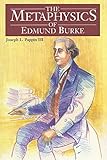The Metaphysics of Edmund Burke / Joseph Pappin.
Material type: TextPublisher: New York, NY : Fordham University Press, [2022]Copyright date: ©1993Description: 1 online resource (188 p.)Content type:
TextPublisher: New York, NY : Fordham University Press, [2022]Copyright date: ©1993Description: 1 online resource (188 p.)Content type: - 9780823213658
- 9780823296941
- online - DeGruyter
| Item type | Current library | Call number | URL | Status | Notes | Barcode | |
|---|---|---|---|---|---|---|---|
 eBook
eBook
|
Biblioteca "Angelicum" Pont. Univ. S.Tommaso d'Aquino Nuvola online | online - DeGruyter (Browse shelf(Opens below)) | Online access | Not for loan (Accesso limitato) | Accesso per gli utenti autorizzati / Access for authorized users | (dgr)9780823296941 |
Browsing Biblioteca "Angelicum" Pont. Univ. S.Tommaso d'Aquino shelves, Shelving location: Nuvola online Close shelf browser (Hides shelf browser)

|

|

|

|

|

|

|
||
| online - DeGruyter The Logic of Passion : The Literary Criticism of William Hazlitt / | online - DeGruyter The Love of Learning and The Desire God : A Study of Monastic Culture / | online - DeGruyter The Man Who Rode the Tiger : The Life and Times of Judge Samuel Seabury / | online - DeGruyter The Metaphysics of Edmund Burke / | online - DeGruyter The Mortal Presidency : Illness and Anguish in the White House / | online - DeGruyter The Mystical Element in Heidegger's Thought / | online - DeGruyter The New Deal and the Problem of Monopoly : A Study in Economic Ambivalence / |
Frontmatter -- Contents -- Acknowledgments -- Abbreviations -- Foreword -- Introduction -- 1 Metaphysics and Politics -- 2 The Problem of a Burkean Metaphysics -- 3 The Case for Burke's Metaphysics -- 4 The Philosophy of God and Human Nature -- 5 The Metaphysical Elements of Teleology and Natural Law -- 6 Concluding Reflections: Metaphysical Nihilism and Radical Individualism -- SELECTED BIBLIOGRAPHY -- Index
restricted access online access with authorization star
http://purl.org/coar/access_right/c_16ec
The most recent commentators on Edmund Burke have renewed the charge that his political thought lacks the consistency and coherency necessary to even claim the status of a political philosophy and that he is indeed a "utilitarian." They mark him off as an "ideologist," a "rhetorician," and a "deliberate propagandist." Even Burke’s Reflections on the Revolution in France, his most profound statement of a political philosophy, is regarded by some as a work of mere "persuasion," not "philosophy." All this occurs in spite of the seminal work of Stanlis, Canavan, and Wilkins, who in the 1950s and ‘60s, demonstrated the natural law foundations of Burke’s politics. Burke revisionists, forced to acknowledge his use of the "natural law," label such use as a rhetorical means for utilitarian ends. Directly opposed to this renewed "utilitarian" interpretation of Burke is Joseph Pappin’s work The Metaphysics of Edmund Burke. Not only does this work challenge the "utilitarian" view of Burke, it sets out, as not other work on Burke has attempted to do, "to make explicit the implicit metaphysical core of Burke’s political thought." Pappin does this by examining both Burke’s critics and Burke’s own attack on a rationalist, ideologically inspired metaphysics. Drawing from Burke’s vast writings, Pappin establishes as his goal "to demonstrate that Burke’s political philosophy is grounded in a realist metaphysic, one that is basically consonant with the Aristotelian-Thomistic tradition." Does the author succeed? According to Francis Canavan, in his Foreword to this work, the "explanatory key" of a realist metaphysics grounding Burke’s politics "is a key that fits the lock better than any other that scholars have offered." Canavan further holds that the author offers "us a more thorough analysis of Burke’s understanding of God, the creation, nature, man, and society than has previously appeared."
Mode of access: Internet via World Wide Web.
In English.
Description based on online resource; title from PDF title page (publisher's Web site, viewed 03. Jan 2023)


